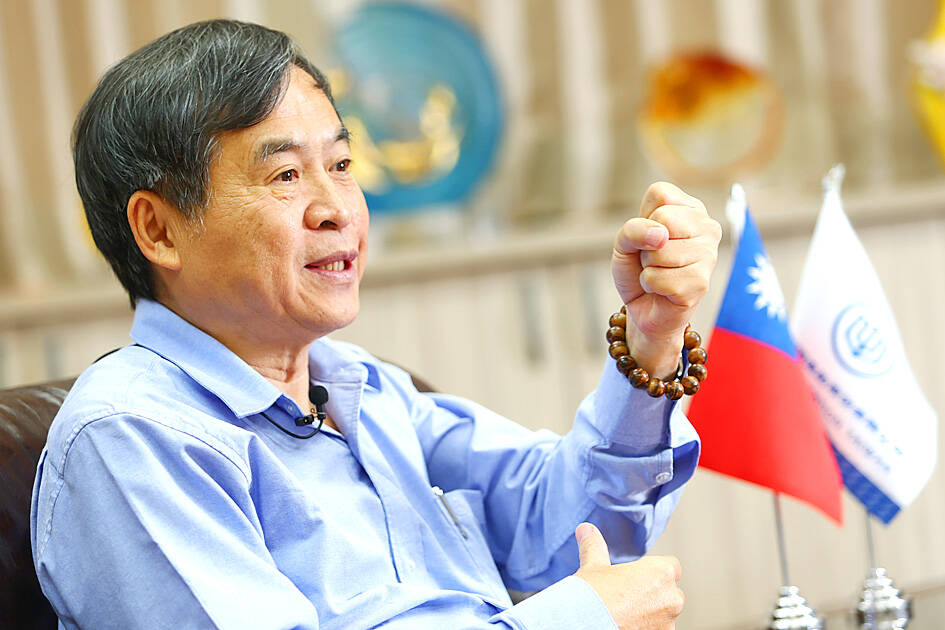CSBC Corp, Taiwan has been able to overcome some significant problems that arose while building a prototype of the nation’s first domestically made submarine, CSBC chairman Cheng Wen-lon (鄭文隆) said on Wednesday last week.
Earlier this year, Cheng said that the prototype would undergo final tests in September.
“We have been able to build 85 components locally so far,” Cheng said, after a source familiar with the program in January revealed that more than 40 percent of the submarine’s main body is being manufactured in Taiwan.

Photo: CNA
This would include airtight doors, a water conversion system, hydraulic system and a silent air-conditioning system, the source said.
Giving an example of how difficult it is to build a modern submarine, Cheng cited the need for silent toilets.
As Taiwan lacks experience building submarines, it had to procure 107 core technologies from overseas to build what is known as the “red zone” of the vessel, and manufacture the rest itself, he said.
Due to the silence required on submarines, Cheng’s team initially planned to import toilets costing NT$670,000 (US$21,744) each.
However, the price drew a public backlash, and the 990-member team in charge of building the submarine turned to local companies to manufacture the toilets for NT$150,000 each, he said.
The Ministry of National Defense has divided the hardware and technology needed to build a submarine into red, yellow and green categories, with red parts needing to be imported, yellow parts potentially made locally and green parts readily made in Taiwan.
Some red category technologies beyond Taiwan’s submarine design and building capability, such as diesel engines, torpedo tubes and other combat equipment, have been procured from overseas, the source said.
The construction of the prototype has continued around the clock since work started in 2020, Cheng said.
Other problems were overcome with the cooperation of the Naval Shipbuilding Development Center, the navy’s 256th Submarine Squadron, the Chungshan Institute of Science and Technology and a CSBC task force.
“We worked as partners rather than buyers and sellers,” he said.
After CSBC completes shipyard testing of the submarine in September, Cheng said the company would conduct harbor and sea operations tests before delivering the submarine to the navy.
Taiwan has allocated a NT$49.36 billion budget over seven years — from 2019 to 2025 — to build the prototype, with a plan to launch an indigenous submarine building program that would make it less dependent on other countries.
Such efforts could help Taiwan develop a national defense industry, and even enable the country to become a key submarine exporter, he said.
Although it has previously been reported that Taiwan is planning to allocate NT$300 billion to build a fleet of eight submarines as part of the Indigenous Defense Submarine Program, this has not been publicly confirmed by the military, and the ministry said such a plan requires further evaluation.

A Vietnamese migrant worker on Thursday won the NT$12 million (US$383,590) jackpot on a scratch-off lottery ticket she bought from a lottery shop in Changhua County’s Puyan Township (埔鹽), Taiwan Lottery Co said yesterday. The lottery winner, who is in her 30s and married, said she would continue to work in Taiwan and send her winnings to her family in Vietnam to improve their life. More Taiwanese and migrant workers have flocked to the lottery shop on Sec 2 of Jhangshuei Road (彰水路) to share in the luck. The shop owner, surnamed Chen (陳), said that his shop has been open for just

Global bodies should stop excluding Taiwan for political reasons, President William Lai (賴清德) told Pope Francis in a letter, adding that he agrees war has no winners. The Vatican is one of only 12 countries to retain formal diplomatic ties with Taiwan, and Taipei has watched with concern efforts by Beijing and the Holy See to improve ties. In October, the Vatican and China extended an accord on the appointment of Catholic bishops in China for four years, pointing to a new level of trust between the two parties. Lai, writing to the pope in response to the pontiff’s message on Jan. 1’s

TAKE BREAKS: A woman developed cystitis by refusing to get up to use the bathroom while playing mahjong for fear of disturbing her winning streak, a doctor said People should stand up and move around often while traveling or playing mahjong during the Lunar New Year holiday, as prolonged sitting can lead to cystitis or hemorrhoids, doctors said. Yuan’s General Hospital urologist Lee Tsung-hsi (李宗熹) said that he treated a 63-year-old woman surnamed Chao (趙) who had been sitting motionless and holding off going to the bathroom, increasing her risk of bladder infection. Chao would drink beverages and not urinate for several hours while playing mahjong with friends and family, especially when she was on a winning streak, afraid that using the bathroom would ruin her luck, he said. She had

MUST REMAIN FREE: A Chinese takeover of Taiwan would lead to a global conflict, and if the nation blows up, the world’s factories would fall in a week, a minister said Taiwan is like Prague in 1938 facing Adolf Hitler; only if Taiwan remains free and democratic would the world be safe, Deputy Minister of Foreign Affairs Francois Wu (吳志中) said in an interview with Italian newspaper Corriere della Sera. The ministry on Saturday said Corriere della Sera is one of Italy’s oldest and most read newspapers, frequently covers European economic and political issues, and that Wu agreed to an interview with the paper’s senior political analyst Massimo Franco in Taipei on Jan. 3. The interview was published on Jan. 26 with the title “Taiwan like Prague in 1938 with Hitler,” the ministry